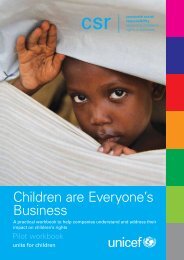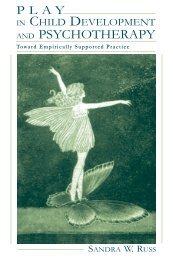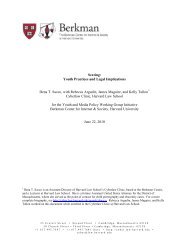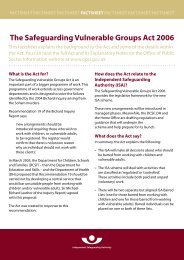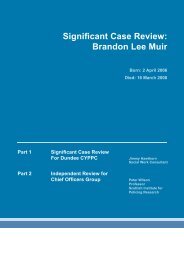Vetting and disclosures - Fair Play For Children
Vetting and disclosures - Fair Play For Children
Vetting and disclosures - Fair Play For Children
You also want an ePaper? Increase the reach of your titles
YUMPU automatically turns print PDFs into web optimized ePapers that Google loves.
<strong>Vetting</strong> <strong>and</strong> Disclosures: Getting it right in practice.<br />
A Report from the Child Protection All Party Parliamentary Group<br />
The Child Protection All Party Parliamentary Group<br />
The Child Protection All Party Parliamentary Group was formed to raise the profile of child protection in Parliament <strong>and</strong> to<br />
investigate policy matters. The officers of the group are: Chair, Meg Munn MP (Labour), Vice Chair Andrea Leadsom MP<br />
(Conservative), Treasurer Annette Brooke MP (Liberal Democrat) <strong>and</strong> Secretary Cathy Jamieson MP (Labour). The group<br />
is grateful to the NSPCC who provide the secretariat.<br />
In summer 2011, the Child Protection All Party Parliamentary Group held an enquiry into the implementation of the<br />
Government’s changes to the vetting <strong>and</strong> barring <strong>and</strong> criminal records disclosure systems.<br />
Members of the group who participated in this enquiry were Meg Munn MP, Jessica Lee MP, Nic Dakin MP, Ann Coffey MP,<br />
Andrew Percy MP, Bill Esterson MP <strong>and</strong> Baroness Dame Tanni Grey-Thompson.<br />
Evidence was given to the group by Sue Law (Football Association), Nicola Sheldon (RFU), Abby Wood (Girlguiding UK),<br />
Shaun Kelly (Action for <strong>Children</strong>), Mike Locke (Volunteering Engl<strong>and</strong>), <strong>and</strong> the Minister with responsibility for the scheme,<br />
Lynne Featherstone MP.<br />
The report was also informed by two separate online surveys one for practitioners <strong>and</strong> organisations <strong>and</strong> one for<br />
volunteers <strong>and</strong> parents.<br />
The group wishes to thank all those who gave evidence <strong>and</strong> responded to our surveys.<br />
Executive Summary<br />
This report draws out the key messages from the evidence we received, <strong>and</strong> sets out the following<br />
recommendations for Government:<br />
1. Government should bring forward an amendment to the Protection of Freedoms Bill during<br />
report stage to tighten up the definition of supervision for the purposes of the vetting <strong>and</strong><br />
barring scheme.<br />
2. Government guidance <strong>and</strong> communications about the vetting <strong>and</strong> barring scheme must be very<br />
clear about activity that is included in the scheme, <strong>and</strong> what supervision is required for positions<br />
outside the scheme.<br />
3. Government needs to communicate better with large organisations that use the online Criminal<br />
Records Bureau (CRB) service (e-bulk) to reassure them about how the system will work in the<br />
future, <strong>and</strong> should encourage other organisations to sign up to the scheme.<br />
4. Government must clarify whether individuals who do not subscribe to the new online updating<br />
service will be able to use their CRB disclosure when they move between positions, <strong>and</strong> whether<br />
their employers will be alerted if they are barred from working with children.<br />
5. Government should produce statutory guidance setting out in more detail how employers <strong>and</strong><br />
volunteering organisations should use the scheme, <strong>and</strong> must make this guidance easily accessible<br />
for those who might use the scheme.<br />
6. Government must ensure there is sufficient support for all employers <strong>and</strong> voluntary<br />
organisations that use the scheme. This could include funding intermediary organisations to<br />
provide training <strong>and</strong> resources.<br />
7. Government should explore ideas for interactive support to help employers make decisions<br />
about safer recruitment.<br />
8. Government should create an advice service to help employers make informed decisions on the<br />
basis of information they receive through CRB checks. The contact details for this service should<br />
be contained on all CRB certificates.<br />
1
9. Government must communicate with the public about the scheme, <strong>and</strong> do so in a way which<br />
builds public support for the proportionate use of checking.<br />
10. Government must support <strong>and</strong> encourage employers to develop safe practice, <strong>and</strong> incorporate<br />
messages about safeguarding in any communications relating to the revised vetting <strong>and</strong> barring<br />
scheme.<br />
Introduction<br />
1. The UK Government is changing the way in which the vetting <strong>and</strong> barring <strong>and</strong> criminal records<br />
disclosure systems work in Engl<strong>and</strong>, Wales <strong>and</strong> Northern Irel<strong>and</strong>. There has been a lot of debate<br />
about, <strong>and</strong> scrutiny of, the changes to the scheme which are contained within the Protection of<br />
Freedoms Bill currently making its way through Parliament.<br />
2. However the proof of the pudding is in the eating. Barring <strong>and</strong> checking will only help to keep<br />
children safe if employers <strong>and</strong> voluntary organisations use the systems properly: seeking out<br />
information on individuals who work with children <strong>and</strong> using this information to make sensible<br />
decisions about recruitment <strong>and</strong> management of staff.<br />
3. With this in mind, the Child Protection All Party Parliamentary Group held an enquiry in June<br />
<strong>and</strong> July 2011 into the implementation of the changes to vetting <strong>and</strong> <strong>disclosures</strong>. We heard<br />
evidence from representatives of organisations that employ staff or volunteers to work with<br />
children, met Lynne Featherstone MP the Minister responsible for the scheme, <strong>and</strong> conducted<br />
two online surveys to seek further views. This report draws out the key messages from the<br />
evidence we received, <strong>and</strong> sets out recommendations for Government.<br />
4. We hope that our work will play a valuable role in challenging <strong>and</strong> assisting Government to<br />
consider how best to ensure that employers <strong>and</strong> voluntary organisations use the new vetting <strong>and</strong><br />
disclosure scheme effectively, <strong>and</strong> take other necessary steps to keep children safe.<br />
Part 1: The design of the scheme<br />
5. This enquiry set out to investigate the implementation of the new vetting <strong>and</strong> disclosure scheme,<br />
not their design. However, unsurprisingly, we did end up discussing some of the design of the<br />
scheme, <strong>and</strong> feel it is appropriate to reflect the key points of those discussions in this report.<br />
The changes to the vetting <strong>and</strong> barring scheme<br />
The <strong>Vetting</strong> <strong>and</strong> Barring Scheme aims to prevent unsuitable people from undertaking certain paid or<br />
volunteer work with children or vulnerable adults (‘regulated activity’). It does this by vetting all<br />
those who wish to do such work <strong>and</strong> barring those who have committed a certain offence or where<br />
the barring authority believes they pose a risk of harm to vulnerable people.<br />
Everyone working in regulated activity must be CRB checked, <strong>and</strong> barred individuals will be<br />
prohibited from working in these positions (although they can work with children in positions<br />
outside regulated activity).<br />
The Protection of Freedoms Bill reduces the scope of ‘regulated activity relating to children’ which<br />
specifies what work a person is barred from doing if he or she is included in the children’s barred list.<br />
Regulated activity still covers much paid <strong>and</strong> unpaid work that involves close interaction with<br />
children, or work in specified places such as schools where individuals have the opportunity for<br />
contact with children. However, as a result of the Government’s changes, regulated activity relating<br />
to children no longer covers the following positions:<br />
• Supervision, teaching, training, instruction or care of children by a person who is subject to<br />
regular day to day supervision in their work, UNLESS the activity involves certain types of<br />
personal care or takes place in a specified place such as a school or children’s home.<br />
2
• Provision of legal advice to a child.<br />
• Temporary or occasional work, such as building work, in a specified place such as a school or<br />
children’s home.<br />
• Supervised volunteer work in specified setting such as schools or children’s homes.<br />
• The work of people in governance or senior management roles, or officials in the <strong>Children</strong> <strong>and</strong><br />
Family Court’s Advisory Service or inspectorates.<br />
The changes mean that people on the barred list will be able to work in these positions.<br />
Thresholds for regulated activity<br />
6. Regulated activity refers to the positions which are covered by vetting <strong>and</strong> barring arrangements.<br />
If an individual has been barred, they will still be able to work with children in positions that do<br />
not count as regulated activity, <strong>and</strong> their employers 1 will not be told if they are barred – even if<br />
they conduct an enhanced Criminal Records Bureau (CRB) check (which they would not have to<br />
do). Therefore it is very important that the regulated activity category covers all those positions<br />
where individuals have regular close contact <strong>and</strong> can develop trusting relationships with children.<br />
7. The witnesses who gave evidence to our enquiry all raised<br />
concerns about the fact that many people under “regular day to<br />
day supervision” in their work with children will not fall within<br />
the category of regulated activity in the changed vetting <strong>and</strong><br />
barring scheme, <strong>and</strong> therefore will not have to be CRB checked.<br />
We were given the example of a junior football coach, who<br />
might take a group of children away to a pitch far away from the<br />
head coach, <strong>and</strong> yet would still be seen as under supervision <strong>and</strong><br />
so would not be checked.<br />
8. The Minister reassured us that positions such as the football<br />
coach, where an individual takes groups of children away from<br />
the main supervising adult, would count as regulated activity,<br />
<strong>and</strong> that this would be set out clearly in guidance for employers.<br />
This is reassuring: it is very important that employers are told<br />
that supervised positions will only be exempt from regulated<br />
activity if individuals are under close supervision. The Protection<br />
of Freedoms Bill, as currently written, is not clear on this point.<br />
“… a large proportion of activity in our<br />
sector is undertaken by those who are<br />
technically being supervised by<br />
another, but, in real terms the<br />
supervision has little control over<br />
what happens… <strong>and</strong> adults therefore<br />
still have a significant opportunity to<br />
gain trust <strong>and</strong> influence over<br />
children.”<br />
“…abuse won’t happen in the middle<br />
of a sports pitch, but the relationship<br />
is established there whether they are<br />
supervised or unsupervised. All<br />
coaches hold a powerful positive over<br />
a child.”<br />
Quotes from responses to our survey.<br />
Recommendation 1: Government should bring forward an amendment to the Protection of<br />
Freedoms Bill during report stage to tighten up the definition of supervision for the purposes<br />
of the vetting <strong>and</strong> barring scheme.<br />
Recommendation 2: Government guidance <strong>and</strong> communications about the vetting <strong>and</strong><br />
barring scheme must be very clear about activity that is included in the scheme, <strong>and</strong> what<br />
supervision is required for positions outside the scheme.<br />
Single Disclosures<br />
9. The Protection of Freedoms Bill changes the way in which CRB <strong>disclosures</strong> will be shared.<br />
Currently, when an individual gets a CRB disclosure, their certificate is simultaneously sent to<br />
them <strong>and</strong> to their employer. In the future CRB <strong>disclosures</strong> will only be sent to the individual<br />
involved <strong>and</strong> employers will have to obtain it from them.<br />
1 Throughout this report, the term ‘employers’ is used to cover any organisation that may employ paid staff, consultants or volunteers to<br />
work with children.<br />
3
“…it would place a huge burden on<br />
our volunteers to chase copies of CRB<br />
checks...”<br />
“If we are relying on individuals<br />
sending us their certificate, the<br />
process will take longer, <strong>and</strong> as the<br />
majority of these people are<br />
volunteers, there is not always the<br />
urgency in dealing with paperwork.<br />
This could mean school <strong>and</strong> club<br />
sessions may not be able to run.”<br />
Quotes from responses to our survey.<br />
10. The witnesses we spoke to raised concerns about this<br />
proposal. It was felt that this would result in extra<br />
bureaucracy <strong>and</strong> delay as organisations have to chase people<br />
to share their certificates. There were also concerns that<br />
once people see the information disclosed they may not<br />
want to share it because they are embarrassed about what it<br />
reveals, or think that minor offences might count against<br />
them.<br />
11. Again, on this point, the Minister offered us some assurance.<br />
We were told that if large organisations use the online<br />
system for obtaining CRB <strong>disclosures</strong> (e-bulk), then they will<br />
get an alert when individuals’ CRB certificates are issued, <strong>and</strong><br />
will be told if any disclosure has been made. It is estimated<br />
that only 5% of CRB certificates disclose any information.<br />
This system means that organisations will not have to obtain copies of everyone’s CRB<br />
certificates, but will be able to focus on those people known to have a criminal record.<br />
Recommendation 3: Government needs to communicate better with large organisations that<br />
use the online CRB service (e-bulk) to reassure them about how the system will work in the<br />
future, <strong>and</strong> should encourage other organisations to sign up to the scheme.<br />
Online Updating<br />
12. In the future, CRB checks will be portable so that instead of having to get a new disclosure for<br />
every position – as now – individuals will be able to move between roles <strong>and</strong> take their CRB<br />
certificates with them. We welcome the introduction of portability, as did many of our<br />
witnesses. It reduces a lot of the cost, bureaucracy <strong>and</strong> frustration associated with the scheme at<br />
present.<br />
13. We were grateful to the Minister <strong>and</strong> her officials for explaining to us in more depth how the<br />
new system will work, which we underst<strong>and</strong> to be as follows: An individual will receive a CRB<br />
disclosure with a unique number on it. If the individual, or employer, pays a fee (around £9 per<br />
year) then any employer will be able to go online, check the unique number <strong>and</strong> find out if any<br />
information has come to light since the CRB certificate was issued. If this is the case, then the<br />
employer should not accept the certificate but should ask for a more up to date disclosure.<br />
14. Once employers have checked an individual’s disclosure, they will need to return to the website<br />
again in future to check that the disclosure has not changed. However if the individual is<br />
subsequently barred from regulated activity, employers will be notified immediately.<br />
15. We feel this system sounds very sensible. However there are some unanswered questions, for<br />
example:<br />
• CRB <strong>disclosures</strong> will be tailored for regulated activity or non regulated activity, <strong>and</strong> to work with<br />
children <strong>and</strong> work with adults. Is it therefore possible that an individual might have to have four<br />
different <strong>disclosures</strong> <strong>and</strong> pay for continuous updating of all of them Will it be clear to employers<br />
what information the CRB disclosure they see does <strong>and</strong> does not show<br />
• If individuals do not sign up for, or stop paying their annual subscription for the updating service,<br />
will employers still be alerted if they are barred<br />
• If individuals do not sign up for their annual subscription, will they still be able to take their CRB<br />
certificate to different jobs How long will they be able to use a disclosure for before it becomes<br />
invalid Will the first year of online updating be included in the original certificate<br />
16. The Government has said that CRB checks will continue to be free for volunteers. When we<br />
asked, the Minister could not guarantee to us that the online subscription service will also be free<br />
4
for volunteers. She suggested that volunteers could always apply for new (free) CRB certificates,<br />
rather than pay the subscription costs. If this is the case, it is important to be clear how<br />
portability will work for individuals who have not subscribed to the online updating service.<br />
Recommendation 4: Government must clarify whether individuals who do not subscribe to the<br />
new online updating service will be able to use their CRB disclosure when they move between<br />
positions, <strong>and</strong> whether their employers will be alerted if they are barred from working with<br />
children.<br />
Part 2: The Implementation of the Scheme<br />
17. It became obvious as we gathered evidence for this enquiry, that there are currently huge<br />
knowledge gaps <strong>and</strong> misunderst<strong>and</strong>ings about how vetting <strong>and</strong> disclosure systems work. Over<br />
recent years we have seen media stories about the scheme being wrongly applied in cases such<br />
as the church flower arrangers or parents who give lifts to other people’s children. In our<br />
evidence sessions we heard of local leaders who had prevented people working with children<br />
because of irrelevant information on CRB certificates, or who thought they needed to publicly<br />
display CRB certificates in the clubhouse. It is therefore very clear that more must be done to<br />
education the public, volunteering organisations, <strong>and</strong> employers about the new scheme, <strong>and</strong> how<br />
it should be used properly to protect children.<br />
Government guidance<br />
18. We agree with the witnesses who told us that Government needs to write very clear statutory<br />
guidance about the new vetting <strong>and</strong> disclosure schemes. This should contain:<br />
- Clarity on how to assess whether a position is regulated activity or not;<br />
- Advice on who should be CRB checked, including strong messages on the risks of not doing a<br />
CRB check;<br />
- Assistance in completing the CRB form (which should be as simple as possible);<br />
- Clear direction that people shouldn’t be allowed to start work until checks have been seen <strong>and</strong><br />
accepted;<br />
- Help in underst<strong>and</strong>ing what CRB <strong>disclosures</strong> look like <strong>and</strong> how to use the information they<br />
receive effectively to make sensible recruitment <strong>and</strong> management decisions;<br />
- Guidance on how often people should be re-checked;<br />
- Guidance on the wider child protection policies <strong>and</strong> practices that employers should have in<br />
place.<br />
19. We were assured by the Minister that the Government will produce guidance on the new<br />
schemes, <strong>and</strong> that it will be written in partnership with expert organisations such as the NSPCC.<br />
However we were told that the Government is still considering whether this should be<br />
statutory. We believe that the guidance should be statutory as this will create a stronger<br />
incentive for organisations to read it <strong>and</strong> act in accordance with what it says.<br />
Recommendation 5: Government should produce statutory guidance setting out in more<br />
detail how employers <strong>and</strong> volunteering organisations should use the scheme, <strong>and</strong> must make<br />
this guidance easily accessible for those who might use the scheme.<br />
Advice, information <strong>and</strong> active support for employers<br />
20. The new vetting <strong>and</strong> disclosure scheme is complex, <strong>and</strong> guidance alone will not ensure that<br />
everyone working within organisations will gain the skills <strong>and</strong> knowledge they need to use the<br />
5
scheme effectively. It is important that the Government does more to inform <strong>and</strong> educate<br />
employers about how they need to use the scheme in their recruitment <strong>and</strong> management<br />
decisions.<br />
“…In general terms: clear website<br />
based advice, with examples <strong>and</strong> an<br />
opportunity to seek further, more in<br />
depth advice if necessary.<br />
Leaflets/written material is generally<br />
poorly distributed. Too much reliance<br />
is made by local clubs/individuals on<br />
what they read in the press...”<br />
Quote from response to our survey.<br />
about the current arrangements.<br />
21. Respondents to the survey told us they want to see<br />
simple explanations about the scheme, <strong>and</strong> that these<br />
need to be repeated regularly. They also told us they<br />
wanted to see online resources, fact sheets <strong>and</strong> training.<br />
They suggested that there should be sector specific<br />
resources <strong>and</strong> information for different parts of the<br />
children’s workforce. These do not have to be provided<br />
directly by the Government: indeed we know other<br />
organisations already provide very effective resources<br />
22. We were told that Government is planning to hold a series of road shows in up to 20 areas to<br />
talk about the changes. Whilst this is positive, it is only a fraction of what is needed. Materials<br />
should be produced <strong>and</strong> disseminated through a range of channels. It was suggested to us that<br />
government websites, volunteering umbrella bodies, local volunteering centres, local government,<br />
<strong>and</strong> health <strong>and</strong> education workforce organisations should be utilised to disseminate messages.<br />
Recommendation 6: Government must ensure there is sufficient support for all employers <strong>and</strong><br />
voluntary organisations that use the scheme. This could include funding intermediary<br />
organisations to provide training <strong>and</strong> resources.<br />
23. One respondent suggested that there should be an online checklist to help employers to identify<br />
whether positions fall in regulated activity or not. We think that this, <strong>and</strong> any other ideas about<br />
tools which can help employers make decisions about the vetting <strong>and</strong> <strong>disclosures</strong> should be<br />
welcomed <strong>and</strong> explored.<br />
Recommendation 7: Government should explore ideas for interactive support to help<br />
employers make decisions about safer recruitment.<br />
24. Organisations told us that people who deal with CRB checks need training on relevant offences<br />
<strong>and</strong> risk management. Alongside information <strong>and</strong> education, we were also convinced of a need<br />
for active support to help employers make decisions about who<br />
to check <strong>and</strong> what to do with the information they receive. This<br />
could be a confidential phone or email service, or local network<br />
of advisors. Whilst large organisations might have dedicated<br />
people with the expertise to make decisions about how to use<br />
<strong>disclosures</strong>, smaller organisations may struggle <strong>and</strong> will need<br />
support in using the scheme correctly. Without such support<br />
<strong>and</strong> reassurance, we think it is more likely that employers will take the ‘safest’ option <strong>and</strong> not<br />
recruit people who have a criminal record.<br />
“…In our experience, clubs do not have<br />
the necessary skills <strong>and</strong> knowledge to<br />
make fair, accountable, consistent <strong>and</strong><br />
robust decisions about recruitment<br />
based on conviction information...”<br />
Quote from response to our survey.<br />
Recommendation 8: Government should create an advice service to help employers make<br />
informed decisions on the basis of information they receive through CRB checks. The contact<br />
details for this service should be contained on all CRB certificates.<br />
Public education<br />
25. Whilst the general public do not all need to underst<strong>and</strong> the detail of the vetting <strong>and</strong> disclosure<br />
service, as potential employees, volunteers <strong>and</strong> parents, it is important that they have a general<br />
underst<strong>and</strong>ing about the scheme <strong>and</strong> know where to go to get more information.<br />
6
26. In the past, media driven misconceptions that everyone has had to be CRB checked, <strong>and</strong> that<br />
people who have committed minor misdemeanours cannot work with children, have perpetuated<br />
the misuse of the scheme <strong>and</strong> eroded public support. Organisations who contacted the enquiry<br />
“…There needs to be direct<br />
communication from the Government<br />
to parents...”<br />
Quote from response to our survey.<br />
argued that in future Government should more robustly<br />
rebut stories of inappropriate checks <strong>and</strong> myths <strong>and</strong><br />
misconceptions about the scheme in the media.<br />
27. We welcome Government’s ambition to ensure that the<br />
new scheme are proportionate, but are concerned that<br />
their rhetoric suggests that many people will be able to avoid checks completely in the future. As<br />
one witness suggested, if the Government continue to promote the message that far fewer<br />
people need to be checked in the future, this may make people more resistant when asked to<br />
have a check done. Public messages about the scheme therefore must be carefully crafted to<br />
ensure people are willing <strong>and</strong> supportive of proportionate use of checking.<br />
Recommendation 9: Government must communicate with the public about the scheme, <strong>and</strong><br />
do so in a way which builds public support for the proportionate use of checking.<br />
Part 3: Wider messages about safeguarding.<br />
28. Disclosures <strong>and</strong> barring are necessary, but not sufficient to keep children safe, <strong>and</strong> we agree with<br />
the Minister that it is important that employers do not think that conducting a CRB check is the<br />
end of their safeguarding responsibilities.<br />
29. Cases like that of Vanessa George, illustrate that individuals with clear CRB certificates can still<br />
carry out awful abuse of children in their care. The Serious Case Review into the Vanessa<br />
George case identified the characteristics of safe settings as:<br />
• Staff are respectful to all employees as well as children<br />
• Staff are open about discussing good <strong>and</strong> poor practice<br />
• Blame only happens in extreme circumstances<br />
• Leaders model the appropriate behaviour<br />
• Staff are knowledgeable about the vulnerability of the children whom they look after <strong>and</strong><br />
aware that abusers may already be in the employ of the organisation<br />
• <strong>Children</strong> are listened to<br />
• Staff are empowered to challenge poor practice<br />
• Parents are encouraged to be involved in their child’s plan <strong>and</strong> welcomed to the setting<br />
• Whistle blowing procedures are in place <strong>and</strong> staff know how to use them. 2<br />
30. Throughout our enquiry, we were repeatedly told that employers <strong>and</strong> voluntary organisations<br />
need to implement robust child protection policies <strong>and</strong> practices, <strong>and</strong> to develop a culture <strong>and</strong><br />
values which will keep children safe. Some organisations told us about their own work in this<br />
area, including publishing welfare policies, <strong>and</strong> developing networks of trained welfare officers.<br />
We think that this good practice should be identified <strong>and</strong> shared, <strong>and</strong> would like to see sectorled<br />
voluntary codes of practice on child protection accompanied by good practice guidance.<br />
31. In the original terms of reference for the review of vetting <strong>and</strong> barring in October 2010,<br />
Government said that they would consider “how to raise awareness <strong>and</strong> underst<strong>and</strong>ing of risk<br />
<strong>and</strong> responsibility for safeguarding in society more generally”. We think this is incredibly<br />
2<br />
http://www.plymouth.gov.uk/serious_case_review_nursery_z.pdf<br />
7
important <strong>and</strong> would welcome more clarity from the Government about what it is going to do<br />
to achieve this.<br />
Recommendation 10: Government must support <strong>and</strong> encourage employers to develop safe<br />
practice, <strong>and</strong> incorporate messages about safeguarding in any communications relating to the<br />
revised vetting <strong>and</strong> barring scheme.<br />
8


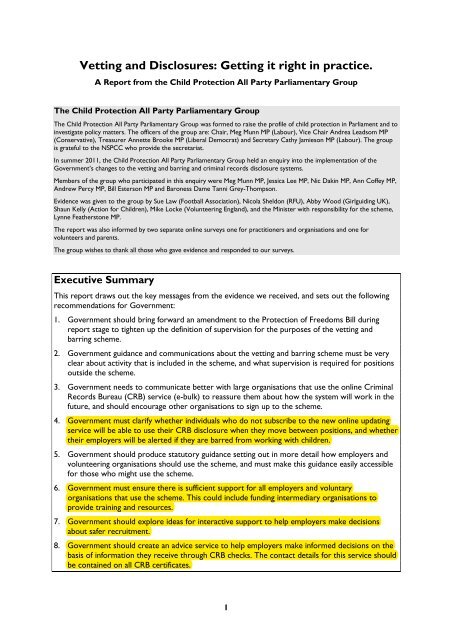

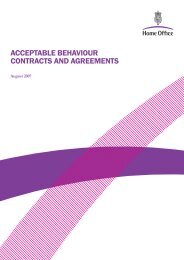
![The Childcare Act 2006 - Notes [Website] - Fair Play For Children](https://img.yumpu.com/50144819/1/184x260/the-childcare-act-2006-notes-website-fair-play-for-children.jpg?quality=85)

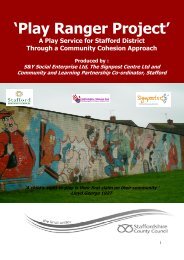


![Bouncy Castles [PDF] - Fair Play For Children](https://img.yumpu.com/45463572/1/184x260/bouncy-castles-pdf-fair-play-for-children.jpg?quality=85)
